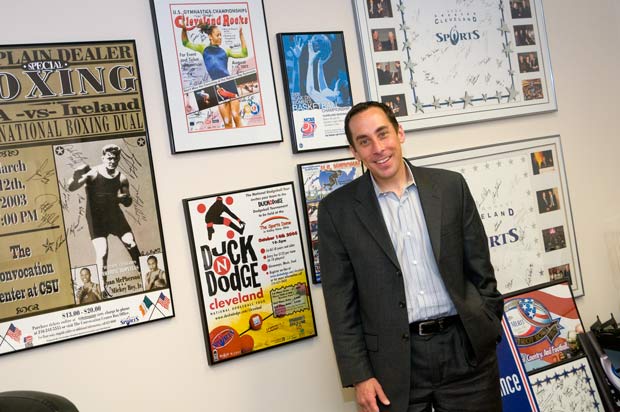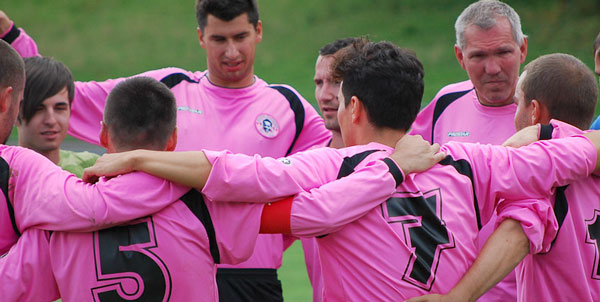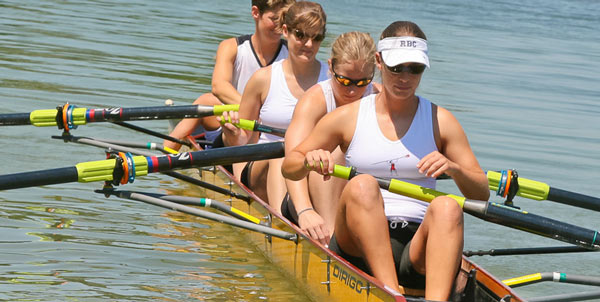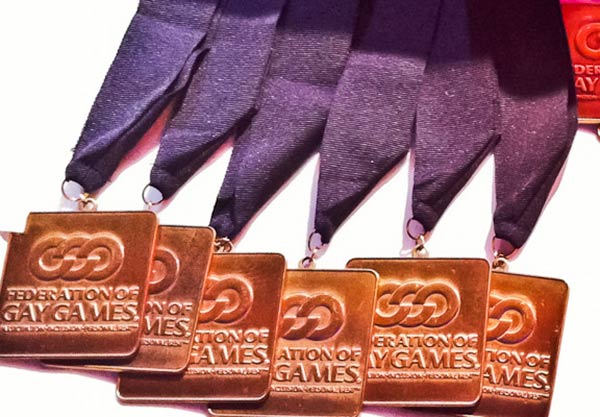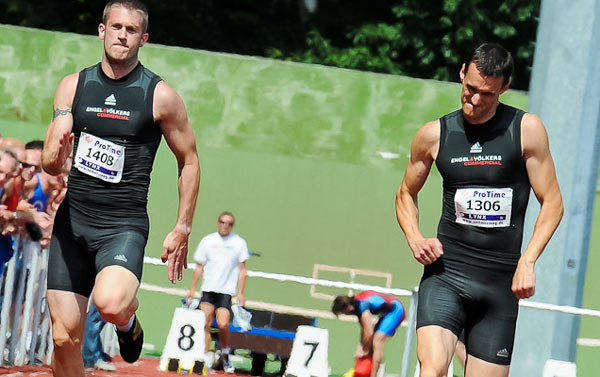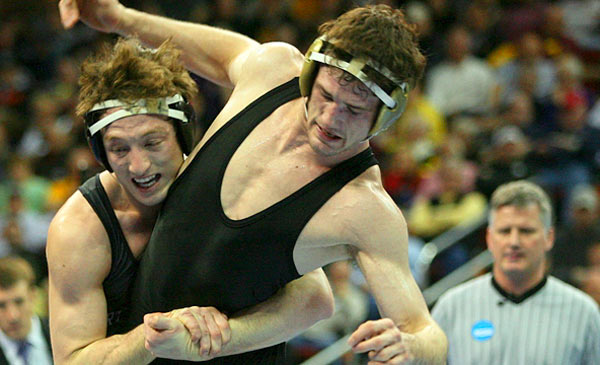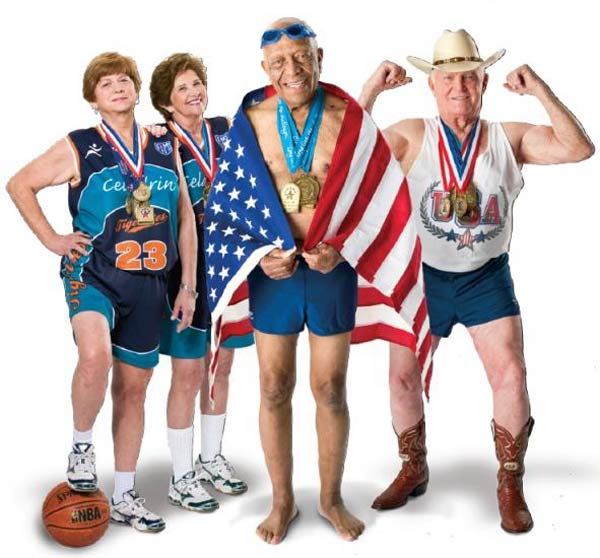the big game: how marquee sporting events improve bottom line, visitor perception
With the city ready to co-host 2014’s largest amateur sporting event in the world, uninformed Cleveland jokes from your friends on the Coasts have never sounded more off-base.
The 2014 Gay Games kick off August 9th with an expected 8,000 to 10,000 participants competing in some 40 sports. The comprehensive event will serve as the latest memo to the world that Cleveland is a sought-after host for large-scale events that add millions to the local economy.
“Cleveland really has become a real top-tier destination for hosting major events,” says David Gilbert, president and CEO of the Greater Cleveland Sports Commission. “The city really punches above its weight in terms of the size and scale of events."
But that didn't happen overnight, he adds. “It’s really taken us a while to get there.”
While we're not likely to see hundreds of thousands of visitors flock to Cleveland for a Super Bowl or a Vegas-style Consumer Electronics Show, the development of facilities like the Cleveland Convention Center and multiple new hotels will only help to grow Cleveland’s potential for hosting attractive events.
Gilbert says that his organization will make a push for an NBA or Major League Baseball all-star game in the coming years. It’s been 17 years since both events were held in the city within five months of each other.
“We have $2.7 billion of visitor-related investment into the city,” notes Positively Cleveland staffer Jennifer Kramer. “We are highlighting, we are renovating, we are building. It puts us in a great position to welcome these large scales of people to come try our product and see what the city has to offer.”
As in Sports, Teamwork Matters
Cleveland beat out Washington D.C. and Boston for the opportunity to host the ninth International Gay Games, but it didn’t do so alone. Cleveland landed on the Federation of Gay Games’ radar primarily by transforming regionalism from an oft-discussed concept to one of actual practice.
Event co-chair Steve Sokany says partnering with Akron, which will host about a third of the events, helped Positively Cleveland pitch the city as part of a region capable of adding facilities like PGA Tour stop Firestone Country Club to the list that includes Case Western Reserve University, Cleveland State University’s Busbey Natatorium and more.
Regionalism also widened the pool of service providers and funding sources. Summa Health Center, the Cleveland Clinic and University Hospitals all signed on as $100,000 sponsors, providing a mix of cash and medical staffing for basketball, swimming and every other competition during the weeklong event. The Gay Community Endowment Fund of the Akron Community Foundation and Summit County Convention and Visitors Bureau also were among the groups who made contributions.
Organizers also struck a first-in-region deal with the Greater Cleveland RTA, Akron’s METRO RTA and Laketran to provide rider passes for the Games’ entire landscape as well as guaranteed transportation for all participants. The Cleveland Foundation became the event’s presenting sponsor by donating a $250,000 grant last April.
The participants from Australia, China, India and 25 other countries, along with their family and friends, are expected to provide at least $40 million in economic impact, Kramer says.
“This is just a perfect example where if you work collaboratively, the outcomes can become so much greater than if you work independently,” adds co-chair Sokany. “I think this is really the first significant example [of regionalism between Cleveland and Akron].”
Picking the Right Horse (Race)
The Greater Cleveland Sports Commission has locked up events as far off as 2018 that could boost Cleveland's bottom line by the millions. Next month, the NCAA Division II Men’s Wrestling Championship will bring 180 athletes -- and an expected $300,000 in outside spending -- to Cleveland.
While that amount is on the low end of what the Commission believes makes an event worth hosting, the nonprofit took it on mainly because it belonged to the NCAA, a main event "bucket" Gilbert says has been golden for Cleveland, aside from U.S. Olympic Committee events.
The Commission hosts 10 to 12 events per year and only makes a bid on about one of every five proposals it receives. Each business model is different, with its own unique set of negotiations that can take anywhere from three months to two years.
“It’s a broad range based on the business model,” Gilbert explains. “Are they going to just bring in their event and run it? Or, often times, we’ll commit certain dollars, events, expenses and infrastructure that we’ll pay for. But we also look toward our general revenue to make up some of those dollars, it could be thousands or it could be millions.”
Ideally, the commission would rather not put money down. Gilbert says that there have only been three times in 14 years that the Commission has had to seek significant philanthropic dollars to bring in an event: 2004’s International Children’s Games; the NCAA Division I Women’s Basketball Final Four in 2007; and last year’s National Senior Games.
Standing Out in a Crowded Field
After several successful host years -- 135 events and $400 million in economic impact since 2000 -- many events are trying to get noticed by Cleveland.
“We’re getting calls saying, ‘Hey, we’re sending this request for proposal to a select number of cities, and we’d like you to be one of them,’” Gilbert says. “That wasn’t happening eight, 10 years ago.”
By all accounts, the Senior Games represented a pinnacle in event attraction for Cleveland. It brought more athletes to the city than were in London for the Summer Olympics the prior year. It attracted 25,000 visitors and $36 million worth of economic impact, with hotels, restaurants and gasoline as the top dollar generators.
Better still, along with those dollars came a shift in visitor opinion. A post-Games report from Kent State University’s department of economics revealed a change in perception of Cleveland amongst arrivals. Visitors rated their average perception of the city a 7.8 out of 10 after the event, up from five out of 10 beforehand.
“While it wasn’t scientific in explaining exactly what a five meant compared to a 7.8, it was clear that it was a significant difference and a significant increase,” Gilbert notes. “There are 25,000 people that now are greater ambassadors for the community, more receptive to messages about visiting Cleveland, moving to Cleveland, doing business in Cleveland.”
Game Plan for Future Success
For now, the Senior Games might be the largest sporting event Cleveland can handle, but that will only increase if Cleveland can secure more hotel investments like last year’s Aloft opening in the Flats East Bank, the soon-to-open downtown Westin and Hilton’s 30-story Convention Center hotel. The city already faces off routinely with Tampa, St. Louis, Columbus and other similarly sized markets for events.
Already Gilbert is looking ahead to 2014 and 2015 calendars full of NCAA wrestling, swimming, baseball and track and field events, while trying to land Olympic trials, marquee NCAA championships and, perhaps, an NBA or MLB all-star game down the line. New Orleans is expecting $90 million in economic impact from its recent all-star weekend thanks to basketball players, entertainers and visitors.
“There’s roughly 30 teams in every league, so based on the law of averages, you only get it back every 30 years,” Gilbert says of pro all-star events. “We certainly don’t want to wait 30 years. With this new infrastructure, it’s certainly the right time to take a look into it.”
Next month, Cleveland will learn how it fared as a finalist for the 2016 U.S. Transplant Games, a lesser-known event that still can bring in 8,000 people and at least $8 million. It would do more for Cleveland’s stellar medical record and continually growing profile as an event host than its coffers.
“In and of itself, [sports] certainly is not going to be what turns Cleveland around, but I think we’re excited that it’s playing a role,” Gilbert explains. “I think it’s also a really good sign that we can do it Cleveland. It’s not an, ‘Oh, woe is us.’ We’re doing it. We compete against other cities, and they choose Cleveland.”
.jpg)


